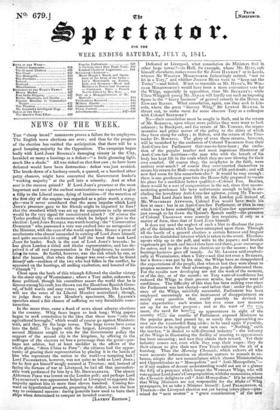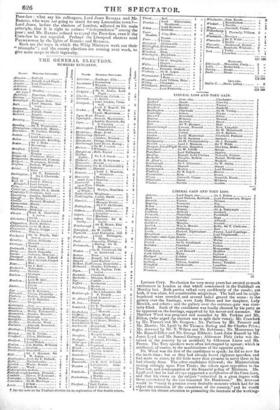NEWS OF THE WEEK.
THE "cheap bread" manceuvre proves a failure for its employers. The English town elections are over ; and thus far the progress
of the election has verified the anticipation that there will be a good lumping majority for the Opposition. The campaign began badly With Lord Joins RussELL's damaging victory in the City, heralded on many a hustings as a defeat—" a little glooming light, much like a shade." All was risked on that first cast ; to have been defeated would have been destruction : defeat wasiust avoided.
The break-down of a hackney-coach, a quarrel, or a hundred other petty chances, might have converted the Government leader's "working majority" at the poll into a minority. And at what eost is the success gained ? If Lord JOHN'S presence at the most important and one of the earliest nominations was expected to give a fillip to the Liberal cause, dying of inanition—if the 'sanction of the first city of the empire was regarded as a prize worth a strug- gle—was it never considered that the same impulse which Lord Jouts's presence gave to his friends might be imparted to foes? that the standard which was set up for supporters to rally around would be the very signal fol. concentrated attack ? Of course the Tories profited by the excitement which he helped to give to the election : Lord JOHN RUSSELL was worth beating : the " Conservative Democrat" who possessed a vote was exalted into an antagonist of the Minister, with the eyes of the world upon him. Hence a press of combatants who almost succeeded in cutting off Lord JOHN himself, and quite succeeded in cutting off half the band that took Lord Jolts for leader. Such is the cost of Lord JOHN'S bravado : he has given London a titled and titular representative, and has de- prived it of all real representation in the Legislature, by neutral- izing its votes. So fearful, however, was the risk which he ran, so fatal the hazard, that when the danger was over—when he found himself safe—reckless of the two who had fallen in the conflict, he appeared on the hustings, all smiling exultation, and boasted of his " triumph " I Close upon the heels of this triumph followed the similar victory in the sister city of Westminster ; where a Tory sailor, unknown to fame political, though his committee assure the world that he is famous among his craft, has thrown out the illustrious Spanish Gene- ral, of bold words and easy votes ; and Westminster, like London, will see the votes of its Liberal Member neutralized ; though, to judge from the new Member's specimens, Mr. LEADER'S speeches stand a fair chance of suffering no very formidable coun- teraction.
In the mean time, came a flood of news about adverse elections in the country. Whig faces began to look long ; Whig papers began to seek consolation in the idea that these were "only the agricultural boroughs," which would of course go against Ministers: wait, said they, for the large towns. The large towns have come into the field. To begin with the largest, Liverpool: there a second Minister sought to win for the Government policy the support of the second city in the kingdom, by offering to the suffrages of the electors no less a personage than the great—per- haps not arbiter, but at least meddler in the affairs of the whole globe, "from China to Peru": the citizens had the oppor- tunity of gracing their representation by placing it in the hands of him who represents the nation to the world—a tempting bait ! Lord PALMERSTON, however, was not quite so bold as Lord JOHN; for he first got himself snugly secured at Tiverton ; and, instead of facing the fortune of war at Liverpool, he had all that uncomfort- able work performed for him by a Mr. BROCKLEBANK. The absent Alderman PIRIE was lowest on the London poll; and perhaps Lord PaLmEavrox's non-appearance helped at Liverpool to augment the majority against him to more than eleven hundred. Coming for- Ward on hypothetical grounds, preparing for defeat, is not the best was to command success : daring generals have used to burn their ships when determined to conquer an invaded country. Defeated at Liverpool, what consolation do Ministers find in other large towns ?—in Hull, for example, where Mr. HUTT, safe himself elsewhere, makes room for Sir Joux HANMER ? or in Leeds, whence Sir WILLIAM MOLESWORTH forbearingly retired, "not to let in a Tory," and whither JOSEPH Hums went to " keep out the Tories"—and failed. If not so tractable as Mr. Hums's, Sir WIL- LIAM MOLESWORTH'S would have been a more convenient vote for the Whigs, especially in opposition, than Mr. BECKETT'S ; while Ultra-Whiggish young Mr. ALID.iu will hardly cut such an imposing figure in the "heavy business" of genteel comedy in the House as EDWARD BAINES. What consolation, again, can they seek in Lin- coln, where the great "literary Whig," Sir LYTTON BULWER, is thrust out, to make room for some obscure Tory as a colleague With COIDDE1 SIBTHORP ?
No—their consolation must be sought in Bath, and in the return of Mr. ROEBUCK, upon whose stern politics they were wont to look askance ; in Stockport, and the return of Mr. COBDEN, the repre- sentative and prime mover of the policy to the skirts of which they have clung for safety ; in Bolton, and the return of the Free- trader Dr. BOWRING. The glory of even these returns, however, will be tarnished by the exclusion of Colonel Tnomrsow from their Anti-Corn-law Parliament that-was-to-have-been ; the exclu- sion, of the popular teacher and most ingenious illustrator of Anti-Corn-law doctrines—the man who with the breath of his body has kept life in the coals which they are now blowing for their own comfort. Of course they, the neophytes in the faith, were zealous over-much ? of course they over-exerted themselves to secure his return for Hull—made it a point of life and death ; and will now find room for him somewhere else ? It would be easy enough : there is one gentleman gone into the House fully prepared to vacate his place for a candidate better qualified—Colonel Fox. Besides, there would be a sort of compensation in the act, since that accom- modating gentleman his been unfortunate enough to help in ex- cluding the hereditary Anti-Corn-law agitator, young Mr. THOMP..., sox. Had Lord JOIIN been fifth on the,,London poll-instead of, Mr. WOLVERLEY ATTWOOD, Colonel Fox would have made his bow-at once : but in an Anti-Corn-,law Parliament, or Mu in one which was to have something of' an Anti-Corn-law appearance— just enough to let down the Queen's Speech easily—the presence of Colonel THOMPSON were scarcely less requisite, if only as a matter of form, than that of Lord „Tons himself. It does not need the neglect of such a hint to disabuse the peo- ple of the delusion which has been attempted upon them. Through all the bustle of a general election a certain flatness and languor evince the diminished interest which is taken in the event. Election- agents whip up to the poll, and write to the papers ; and brutish vagabonds get drunk and breed riots here and there, pour encourager les attires, and to give the true election-air to the season ; but the hustings business goes off tamely. As Mr. LEADER said emphati- cally at Westminster, when a Tory—and that not even a BURDETT, but a Rous—was put by his side, the Whigs have so disappointed . the expectations of the people, that when at last they were about to propose measures for their advantage, the people distrusted them. For the results now developing are not the work of the moment, or of the day, or of the month : no Tory want-of-confidence has reduced the Whigs to their present straits, but popular want of confidence. The difficulty of this time has been making ever since the Parliament was last elected—and before that : under the guid- ance of the Whigs, suicidally successful, Parliament has been employed unceasingly as the instrument of disappointment on nearly every question that could possibly be devised to raise expectation : each session has seen some new measure set up for no other purpose ; and as the want a th:
ment, the need for kee up appearances in sight of the . ning
country wha: we routine of Parliament exposed Ministers to the popular gaze, had passed by, so surely the approaching re- cess saw the counterfeit flung aside-; to be used again if possible, or otherwise to be replaced by some new one. "Nothing," saith the teacher, "is denied to well-directed industry" : the industry of the Whigs in illustrating the futility of trusting to appearances has been unceasing ; and now they obtain their reward. Yet their industry ceases not, even while they reap their wages : they do their utmost to give their new Free Trade agitation the air of a humbug. Thus the Morning Chronicle, which exhorts all who want accurate information on election matters to consult its co- lumns, adopts the new nomenclature which classes Ministerialists and Oppositionists as " Monopolists" and " Anti-Monopolists,"— as if any readers of decent understanding would not see at a glance the folly of a pretence which lumps the WORSLEY Whigs, who will vote against Lord Josites Corn proposition, with the economists, whom the Chronicle delights to call "Anti-Monopolists." If it be objected that Whig Ministers are not responsible for the .fficks of Whig newspapers, let us take a Minister himself: Lord BlidauLasrox, at, Tiverton—the Liverpool election not yet having taken place—pro- mised for "next session" a "grave consideration" of the new Poor-law : what say his colleagues, Lord JOHN RUSSELL and Mr. RARING, who were not going to stand for any Lancashire town F- Lord JOHN, before the electors of London, adhered to his main principle, that it is right to enforce " independence " among the poor ; and Mr. RARING refused to repeal the Poor-law, even if the Corn-law be not repealed. Perhaps the Liverpool electors read PALsiEssTox by the lights of RARING and RUSSELL. Such are the ways in which the Whig Nlinisters work out their -Ai triumphs"; and the county elections are coming next week, to give more scope to their ingenuity.



























